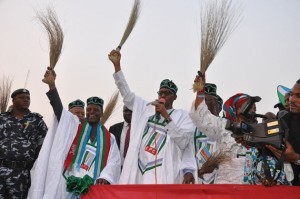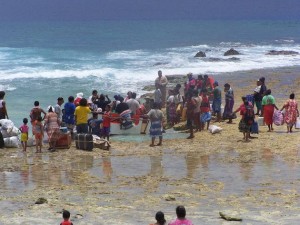
General Buhari holding a broom “to sweep Nigerian politics clean” at a campign rally. Photo: Heinrich Böll Foundation.
This was originally posted to Slugger O’Toole…
There was something discomfiting about the funeral of Lee Kuan Yew. Singapore’s achievements under his rule were extraordinary, but the story presented on his death was a sanitised fable. World leaders queued up to subscribe to the cult of wise old Harry, father of the nation.
Lee wasn’t so benevolent when challenged. Opposition politicians were sued for libel and bankrupted for criticising government policies during election campaigns. When the opposition had the temerity to actually win some seats, the state set out to destroy the new MPs financially and professionally, before gerrymandering them out in the following election.
Ironically, for decades Lee’s PDP would have won every election with an overall majority even under pure PR. He was genuinely loved by the majority of Singaporeans, as the scenes at his funeral showed. That made his suppression of minority opinions all the more distasteful.
It still continues. 16 year-old Amos Yee Pang Sang faces three years in jail for producing an internet video comparing Lee to Jesus Christ, and not in a good way. Both were, he claimed, “power-hungry and malicious but deceive others into thinking they are both compassionate and kind”. (A Singaporean Christian launched a petition calling for his release.)
As a daily church-attending Anglican, I hardly share his view of Christ. Especially in Holy Week, I can’t square Palm Sunday and Good Friday with the idea of a power-hungry Jesus (some of my fellow Christians are another matter). But I’m a lot more offended at our leaders heaping adulation on a country that locks up teenagers for kicking against the pricks on YouTube.
Just when I thought democracy was in the middle of a public relations disaster, two elections in very different countries told a more hopeful tale.
Nigeria’s was expensive, negative and divisive – just like elections in other big democracies. Yet in contrast to the dire predictions of Boko Haram bombings and widespread communal violence, polling was overwhelmingly peaceful and the counting of votes smooth, if slow.
New electronic identity checks made it the cleanest election in Nigerian history. A hefty drop in turnout probably reflects a decline in vote stealing and box stuffing rather than apathy.
Equally crucial to this success were the efforts of civil society monitoring groups (do have a look at the TMG website). Powered by smart phones and smart analysis, an army of ordinary citizen volunteers reported polling day incidents before they became serious problems and ensured that results reported by state election authorities matched those from individual polling stations.
Instead of querying the results and bringing supporters on to the streets, as would once have been the case, Goodluck Jonathan is the first Nigerian President, and only the eighth leader ever in sub-Saharan Africa since independence, to accept defeat at the ballot box. If he leaves office with the public angry at his failure to get to grips with corruption, inequality and Boko Haram, the graceful manner of his departure may earn him a place in the longer term as one of his country’s heroes.
If Nigeria captured headlines, and deservedly so, few people have even heard of the other country with national elections this week.

Cargo is offloaded from tenders that transfer passengers & cargo between the inter-island ferries and each of the outer islands of Tuvalu (here on the island of Niutao). Photo: “Cesqld” on Wikimedia Commons.
The tiny atoll chain of Tuvalu is as far as it’s possible to get from Nigeria, geographically and otherwise. The world’s smallest independent democracy comprises less than 11,000 people on nine atolls and reefs scattered across 400 miles of the remotest Pacific, about half-way between Sydney and Honolulu. Among independent states, only the Vatican has fewer residents.
Political parties don’t exist; personal friendships count for more in constituencies with as few as 150 voters. Political debate can be as boisterous as anywhere, but has always been impeccably peaceful. Global warming is, obviously, the big political topic in a country that might soon be literally washed away by rising tides.
Yet this week’s election was a triumph in the face of adversity as great as Nigeria’s. The highest point in Tuvalu is less than 5 metres above sea level; Cyclone Pam unleashed a 3 metre tidal surge a few weeks ago, wrecking housing, crops and infrastructure. Pam only gave Tuvalu a brush. What would have happened had it hit with the sort of bullseye that struck much bigger and higher-lying Vanuatu barely bears thinking about. Even as it is, perhaps 45% of the population is living in temporary accommodation. Yet people still turned out to vote in big numbers.
Interestingly, like its much larger Pacific neighbour, Australia, Tuvalu has held a referendum on becoming a republic, and replacing Elizabeth II as Head of State. The 2008 poll, however, saw her confirmed in her position by a margin of almost two-to-one. While the election was a generation-defining event in Australia, in Tuvalu only 21% of voters came out to vote, less than a quarter of the number that patronise its intimate general elections.
In our own election season, it’s considered terminally sad to do anything other than affect a jaded cynicism about the whole business. We need to catch ourselves on. Duty and privilege are terribly passé, but the right to elect our government is both of those things. If we want politics to be less cynical, perhaps we need to be less cynical as voters.
After all, if elections didn’t change anything, people around the world wouldn’t be shot for demanding the right to have them.





